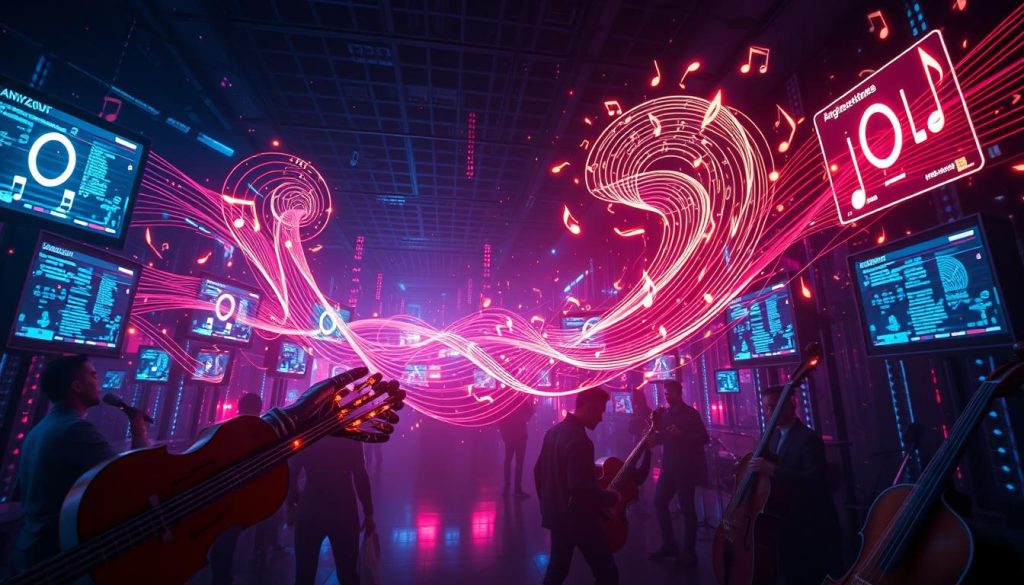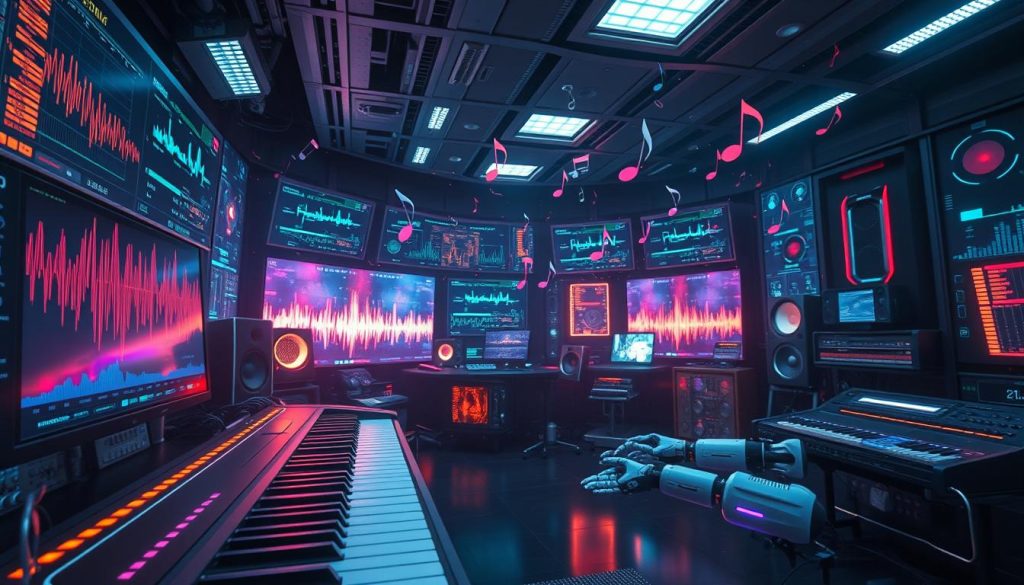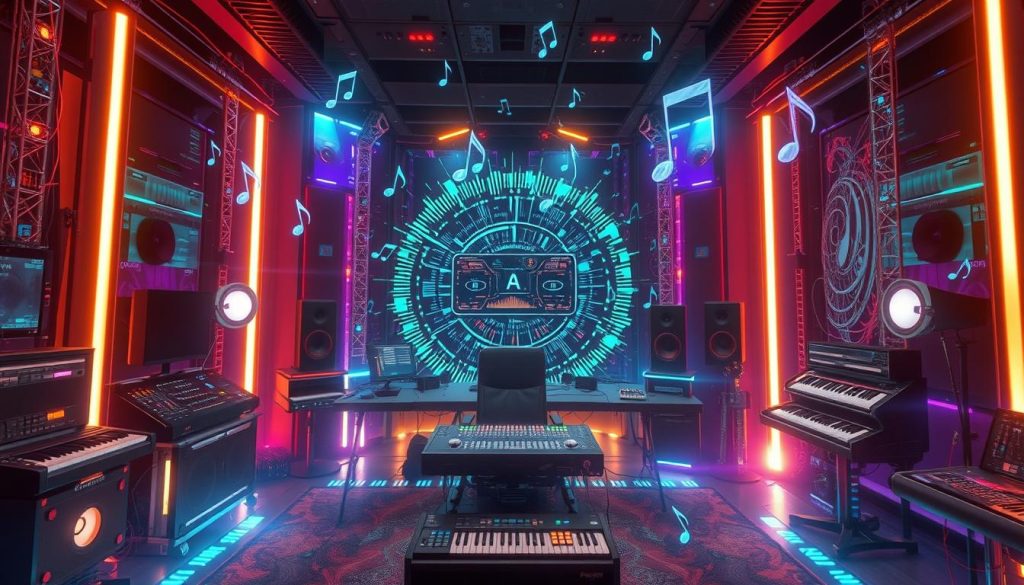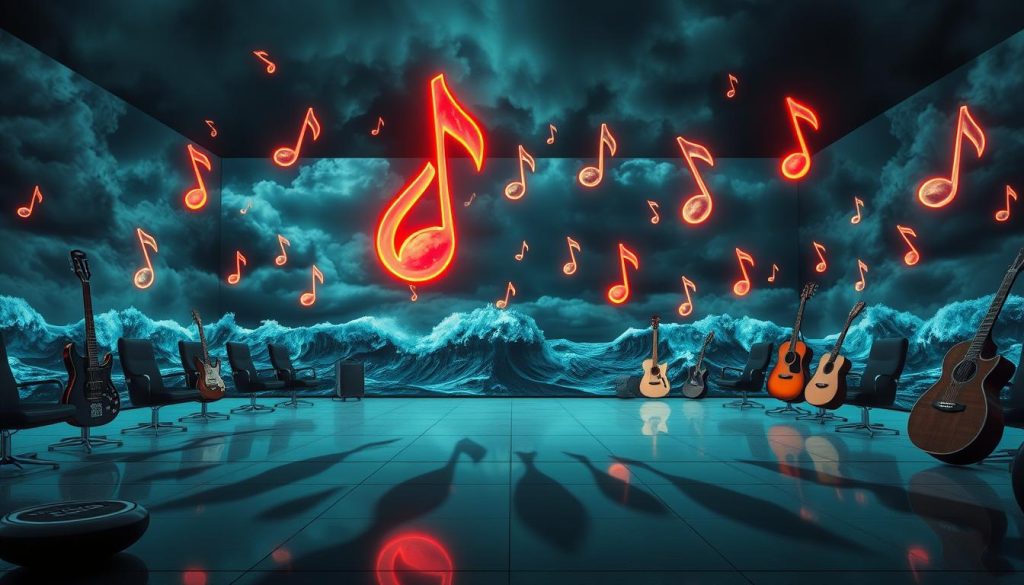The music industry is changing fast, but its approach to new tech is stuck in the past. Big record labels like Universal Music Group, Sony Music Entertainment, and EMI are using AI to make music1. But they’ve always been tough on people who share music without permission. This mix of using new tech and old rules was shown at the VEVO Powerstation event at Sundance, where a pirated NFL game was shown1.
This situation is really ironic. These labels own VEVO, a music streaming service, but they’re strict about copyright1. They go after people who share music illegally. But when it comes to AI music, they seem to be more relaxed, even though they still claim ownership of the music1.
This difference makes people wonder what the music industry really values. As AI music tech gets better2, the industry’s actions will be watched closely. People want fairness and openness in how AI music is used.
Key Takeaways
- Major record labels have heavily invested in AI-powered music generation technology, despite their history of aggressively targeting consumers over alleged music piracy.
- The VEVO incident at the Sundance Film Festival, where a pirated NFL playoff game was displayed, highlights the industry’s hypocritical stance on intellectual property rights.
- The music industry’s approach to AI-generated music raises concerns about its commitment to upholding artistic creativity and ownership.
- The public is demanding a more transparent and equitable approach to the use of AI music generation tools by major labels.
- The ongoing development of AI-powered music generation technology will continue to be a topic of intense scrutiny and debate within the industry.
The Rise of AI Music Generation
The music world has seen a big change with AI music tech. It’s changing how we make music. Tools like algorithmic music creation and neural network synthesis are making a big impact3.
Algorithmic Music Creation: A New Frontier
Algorithmic music uses computer programs to make new songs. It’s changing how artists work, letting them try new things3.
Neural Network Music Synthesis: Revolutionizing Composition
Neural network synthesis is a big deal in music. It uses AI to make music that sounds like it was written by humans. This opens up new ways for humans and machines to work together3.
AI music making has grown fast because of machine learning. Sites like Jukin and Amper Music are using this tech to help artists make music3.
AI’s role in music has been recognized in big ways. For example, AIVA was recognized as a composer by France’s SACEM3.
AI in music has come a long way. From simple ideas in the 20th century to today’s advanced systems, it shows a lot of promise3.
| Metric | Value |
|---|---|
| Percentage of artists using AI for music production | 20.3%4 |
| Percentage of musicians leveraging AI for melody creation, beatmaking, and lyric writing | 60%4 |
| Projected value of the music generation industry by 2027 | $1.10 billion4 |
| Projected growth of the generative AI music market from 2020 to 2028 | From $300 million to $3.1 billion4 |
| Compound Annual Growth Rate (CAGR) of the generative AI music market | Significant4 |
AI is changing the music world in big ways. It’s giving artists new chances to create and work together. But it also makes us think about the future of music4.
Major Labels’ Investment in AI Music Technology
Big record labels like Universal Music Group, Sony Music Entertainment, and Warner Music Group are diving into ai music generation technology5. They see AI as a way to make music production faster and open up new money-making chances6. But, these labels have also been tough on people they think are sharing music without permission, raising questions about their views on creativity and rights.
These labels have sued two AI music start-ups, Suno and Udio5. They want $150,000 for each song they say was copied, pointing out similarities to famous songs like “Johnny B. Goode” and “All I Want for Christmas Is You.”5 They’re focusing on the sound recordings, not the music itself5.
Udio has made a hit song with “BBL Drizzy,” showing AI’s power to create music that people want to listen to6. AI tools like Suno and Udio can also make songs that sound like Bruce Springsteen and Michael Jackson, opening up new possibilities in music6.
The CEO of Suno says their tech creates new music, not just copies5. The lawsuits are a way for big labels to make sure new tech uses their music the right way5.
By working with ai music generation technology, big labels can help make sure AI in music is fair and legal6. This partnership also lets them use the latest music tech, making their music better and faster6.
| Major Label | Involvement in AI Music Lawsuits |
|---|---|
| Universal Music Group | Filed copyright infringement claims against AI music startups Suno and Udio |
| Warner Music Group | Filed copyright infringement claims against AI music startups Suno and Udio |
| Sony Music Entertainment | Filed copyright infringement claims against AI music startups Suno and Udio |
The big labels’ moves into ai music generation technology and their lawsuits against AI music start-ups show the music industry’s mixed feelings about new tech56.
AI Music Generation: The Ethical Dilemma
The rise of AI music generation has sparked a big debate in the music world. This tech could make music production faster and open new ways to make money. But, it also worries about the impact on creativity and who owns the music7.
Respecting Artistic Creativity and Ownership
The debate centers on the role of human artists. As AI gets better at making music, questions arise about its authenticity and ownership8. Soundful, for example, is working to solve these problems. They make sure creators keep their music rights and use only their own data7.
Soundful wants to make music creation more accessible. They offer top-notch tools and strict rules to stop AI misuse7. They also build a community that uses AI responsibly7.
But, the music industry as a whole hasn’t always tackled AI’s ethics. The “Heart on My Sleeve” AI song scandal showed the dangers of copyright issues and artistic confusion8.
As AI music tech grows, the music world and lawmakers must work together. They need to set rules that protect artists, keep music real, and use AI wisely78.
AI Music Generation: Potential Benefits and Drawbacks
AI music generation is changing the music world. It brings new chances and raises big questions. People worry about the realness and human touch in music.
Streamlining Music Production Processes
AI tools are changing how we make music. Almost 60 percent of artists use AI in their work9. By 2030, AI could take up to 50% of the music market9.
The AI music market is set to hit $1.10 billion by 2027, growing fast9. AI can make a song in seconds, much faster than humans10. It helps artists get past creative blocks and try new things, helping new musicians improve10.
Concerns over Authenticity and Human Involvement
AI’s speed in making music is clear, but worries about its realness and human touch remain. 60% of musicians use AI in their work, but 17.3% have doubts about AI in music9. People say AI music lacks emotional depth, a big challenge10.
AI struggles to make truly new music because it uses what’s already out there10. It also raises questions about who owns AI-made songs and could lead to legal issues10.
As AI becomes more common in music, finding a balance is key. We need to keep the human touch in music alive.
“The emergence of AI-generated music has led to the creation of a new music genre that is entirely composed by algorithms and does not involve human composers.”11
AI music could make music more accessible, but it also raises job loss fears11. It might make all music sound too similar, hurting the industry’s diversity11. AI could also carry biases, leading to less diversity in music11.
The VEVO Incident: Highlighting the Hypocrisy
The music industry’s stance on piracy is often debated. The vevo incident at the Sundance Film Festival has brought this hypocrisy to light. Major labels have gone after consumers for piracy, but VEVO showed a pirated NFL game on screens. This shows the industry’s double standards when it comes to copyright use.
This situation is ironic. Labels that fight piracy were caught doing the same thing. The vevo incident shows the hypocrisy of major labels in the piracy vs AI music generation debate.
The music industry’s selective enforcement of copyright laws is a big issue. This latest incident has hurt public trust in their motives. It’s unclear if they’ll apply the same rules to AI music as they do to traditional piracy.
The vevo incident at Sundance is a clear example of the hypocrisy of major labels. They’ve gone after consumers for piracy, but their own actions show disregard for copyright12. It’s uncertain if they’ll treat AI music the same way as traditional piracy.
| Pricing Plans for Content Creators | Regular Price | Promotional Price |
|---|---|---|
| Creator Plan | $16.99 per month | $11.04 per month |
| Artist Starter Plan | $29.99 per month | $19.49 per month |
| Artist Unlimited Plan | $49.99 per month | $32.49 per month |
The vevo incident shows the industry’s willingness to ignore their own copyright issues12. It’s unclear if they’ll apply the same rules to AI music as they do to traditional piracy.
“The irony of the situation is palpable. The very labels that have championed the fight against piracy and the unauthorized use of their content were caught red-handed engaging in the same behavior they have long condemned.”
The vevo incident is a stark reminder of the hypocrisy of major labels in the piracy vs AI music generation debate12. It’s unclear if they’ll apply the same rules to AI music as they do to traditional piracy.
Conclusion
The music industry’s use of AI music generation shows a big hypocrisy. While major labels have actively gone after fans for using AI music, they use it themselves to make more money1314. This shows a big problem with how the industry views creativity, art, and music in the AI era.
As AI music tools become more popular13, the music world must think about the right way to use them. AI can make music fast and cheap14, but it might also take away from human creativity. The industry’s double standards make it clear we need a fair way to deal with AI’s impact on music.
In the end, the music industry’s use of AI and their complaints about it show we need a balance. As music changes, talking openly about AI’s role in making music is key. This will help make a future where artists and fans both win.
FAQ
What is algorithmic music creation?
What is neural network music synthesis?
How have major record labels invested in AI music generation technology?
What are the ethical concerns surrounding AI music generation?
What are the potential benefits and drawbacks of AI music generation?
How does the VEVO incident highlight the hypocrisy of the music industry?
Source Links
- VEVO CEO Tries To Explain Their Hypocritical Act Of Piracy At Sundance | TechCrunch
- Google’s advanced music generation model and two new AI experiments
- The Rise of AI-Generated Music: What It Means for Artists » Flourish$Prosper Music Group
- The Rise of AI in the Music Industry: Is it Taking Over? |
- Major Labels File Suit Against AI Music Start-Ups for Unlicensed Training
- 6 reasons major labels need AI music tech like Suno & Udio
- Ethical Considerations on AI Music | Soundful
- AI in Music Creation and the Ethical Challenges of It
- The Pros and Cons of AI in Music Production – Kits.AI
- An AI Writes Songs: Pros and Cons of Artificial Intelligence in Music Composition
- Music and AI: The Pros, Cons, and Ethical Implications – InterContinental Music Awards
- AI Music Generator SOUNDRAW
- Collaborating With AI Music Generation Platforms: A New Frontier In Songwriting
- The Impact of AI Music Generators on the Music Industry




